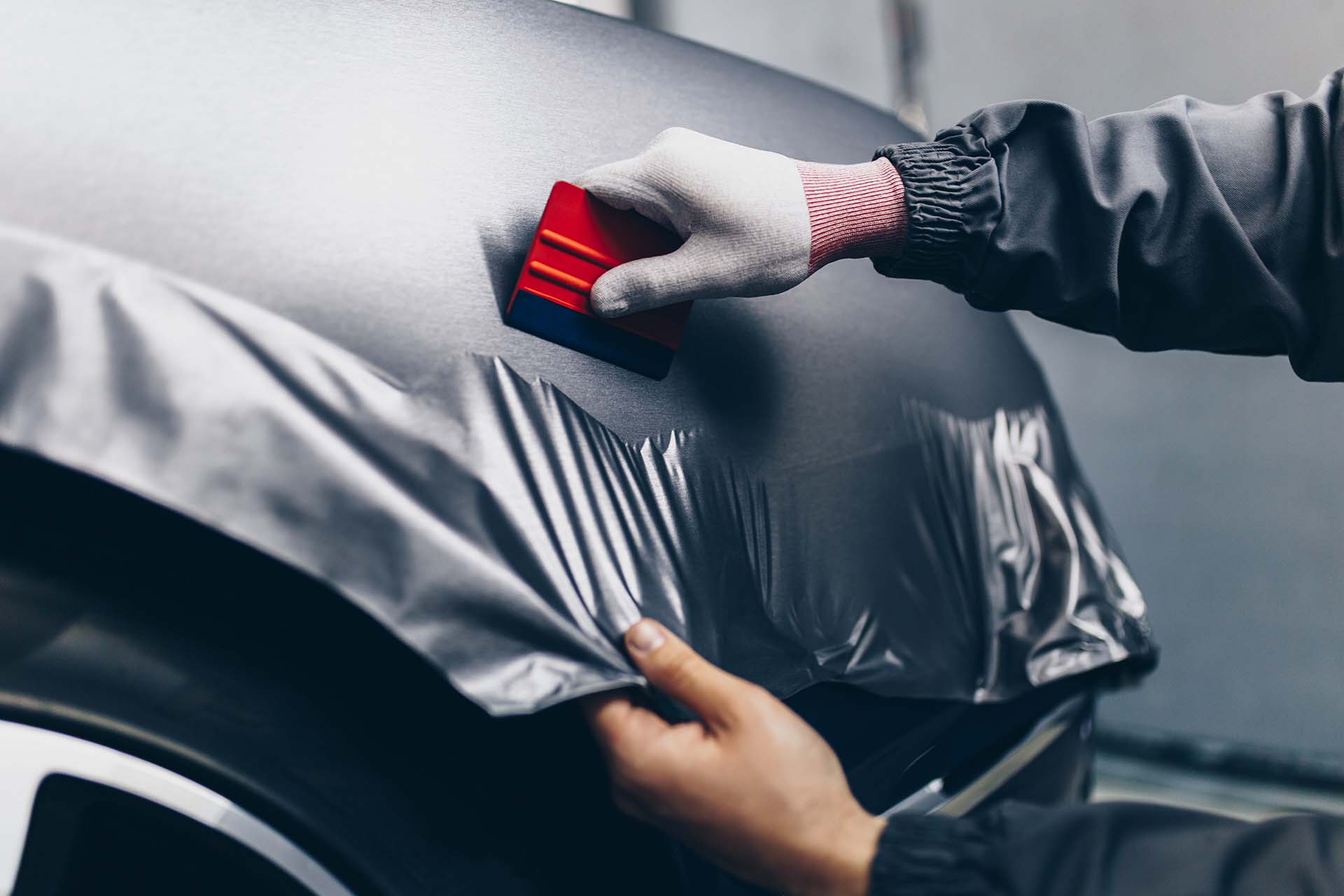Blog>Trade>Starting a Business>How to start a gutter installation business
Last updated: 22 November 2023
How to start a gutter installation business
With the construction industry booming, more and more houses need high-quality guttering. This means installers are highly sought after. Starting your own gutter installation business will help you capitalise on this demand and be your own boss.
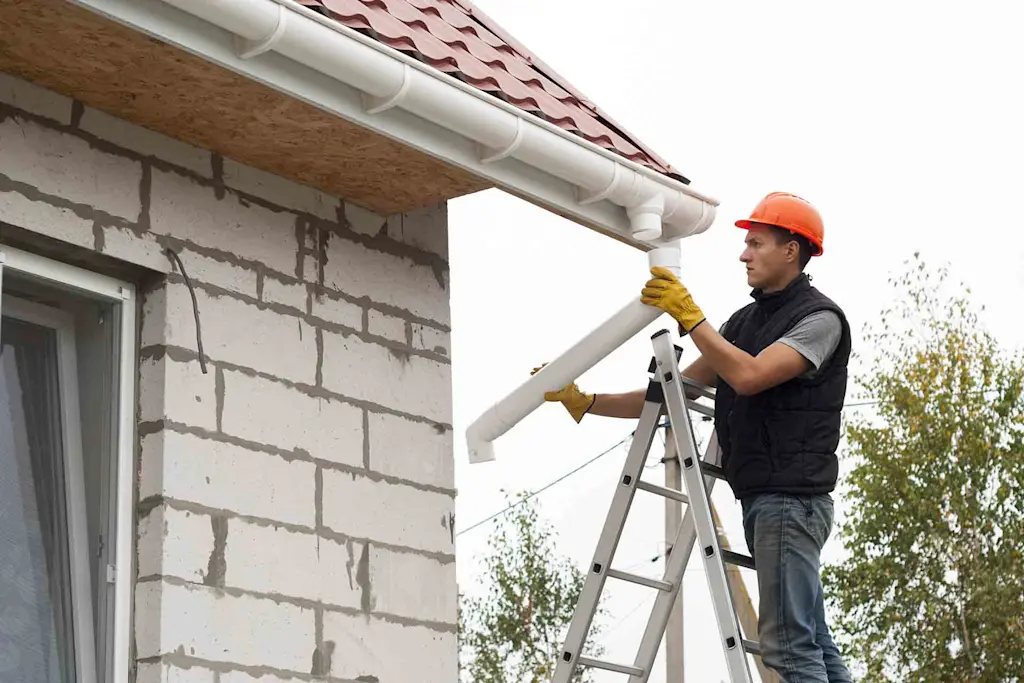
Our guide will cover everything on how to start your own gutter installation company. Learn more about the right steps for success as a gutter installer, including skills, equipment and planning.
Should a self-employed gutter installer have qualifications?
While not essential, qualifications will be very helpful for attracting customers to your gutter installation business. Credentials show you’ve undergone formal training, making you more reliable. Here are the most recognised qualifications for gutter installers:
Level 2 Diploma in Domestic Fascia, Soffit, and Bargeboard Installation
Level 2 or 3 Diploma in Roofing Occupations
Waterproof Membranes Installation intermediate apprenticeship
You should also complete the Construction Skills Certification Scheme (CSCS) for your CSCS card. Without this, you won’t be able to work on construction sites, so you’ll be missing out on profitable contracts.
What trade associations could you join?
Joining a trade association is a great way to enhance your reputation and competitive advantage. Many will require you to pass an assessment to join, so you’ll also hone your skills. Here are the relevant associations for a gutter installer:
Institute of Roofing
National Federation of Roofing Contractors (NFRC)
Chartered Institute of Building (CIOB)
Confederation of Roofing Contractors (CORC)
Give your new business the best chance of success.
Join the best trades on the UK's leading trade directory
What do you need to run a gutter installation business?
During your day-to-day work, you’ll face different scenarios that will challenge your skills. Not only will you need the right skillset to do your job, but also to run your business successfully. Here are some of the most important qualities:
Building and construction knowledge of a variety of building structures
Basic maths skills for managing your financials and taxes
You’ll need a good level of physical fitness for moving and installing guttering
Ability to lead and manage projects
A high standard of customer service to increase your chances of receiving recommendations
Technical understanding of guttering parts and materials
Gutter installation equipment
This is a key part of providing top-quality service. Make sure you’re fully equipped with all the tools you need to complete jobs efficiently and satisfy customers. While equipment can be expensive, it’s worth it for building your reputation and gaining more business.
Here are the essentials for guttering:
Gutter saw
Bending tool
Seamers
Notchers
Outlet punch
Gutter nail driver
Gutter mate
Snips
Gutter coil
Cordless drill
Crimpers
Pop rivet gun
Ladder
Buckets and tarps (for collecting debris)
Also make sure you own a van for transporting all your tools. You don’t want to turn up to a job underprepared.
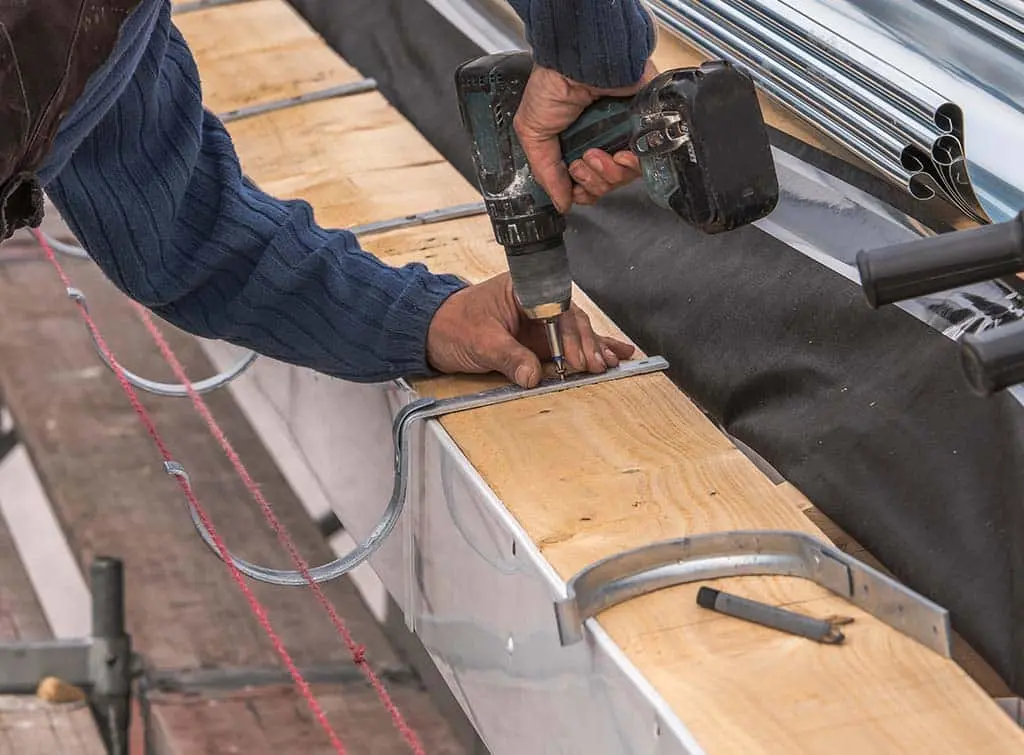
Planning your gutter installation business
When creating a business plan for your gutter installation company, there’s plenty to consider, even for the most experienced tradespeople.
Registration
The first step is legally registering your business. When doing so, you’ll have to decide on a structure. You can either operate as a sole trader or a limited company. This will be down to personal preference. Sole trading is easier to set up, but comes with personal responsibility for business debts. On the other hand, a limited company means more paperwork to manage, but offers greater financial protection.
Building your gutter installation service
You should base your services on your expertise and interests, but also add a unique selling point. For example, you could start a gutter cleaning business that also specialises in certain materials, such as aluminium. Or, as an add-on, provide maintenance for existing customers at a reduced rate. Building an inclusive service can go a long way in retaining existing customers and developing new business.
Become your own boss with Checkatrade
Read case studies to see how our members thrive!
Targeting a market
The next step is to identify a target market. As a gutter installer, you’ll most likely be working with homeowners, but consider narrowing this down. For instance, if you specialise in gutter replacement, you’ll gain more business from targeting areas with older housing. Keep in mind your location too. Scout out the competition in your local area to make sure there’s enough opportunity for you.
Pricing your services
Pricing is key to gaining business. Be sure to research and compare what other businesses are charging so you can set a competitive rate. However, be careful not to set your prices too low. You may end up making a loss overall, or not have the time to complete jobs. If you have a particular niche, there will be higher demand – meaning you can charge more. Be fair with your pricing or your customers may look elsewhere.
Hiring a team for your gutter installation business
As your business grows, you may be looking to hire a team to help with workflow and large projects. When recruiting, always treat this process with care to ensure you’ve hired the right person for the job.
Whether you’re looking for an experienced installer or a new apprentice, remember – they’re representing your business. You might also hire a gutter cleaner to add another service to your portfolio.
Checking local gutter cleaner salary bands will help you attract the right applicants. When hiring, you want to make sure applicants are team players who act professionally.
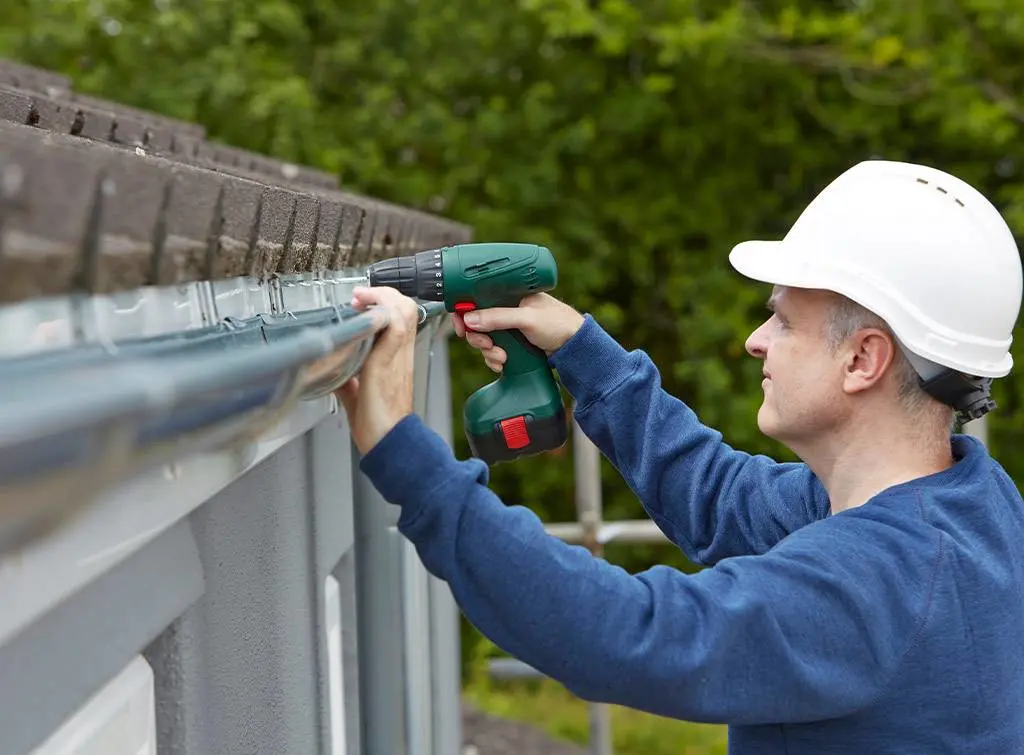
What do you need to know about business finance?
Managing finances may not be the most exciting prospect when going self-employed, but it’s crucial to running a stable business.
Cash flow
You’ll need to keep an eye on your cashflow to ensure you’re making a profit. This is achieved by monitoring all income versus expenditure for your business. At the start, you may be operating at a loss due to investing in essentials such as equipment and supplies.
If you’re concerned by these upfront costs, you may want to take out a business loan. Be mindful of interest rates before you apply.
Taxes
You’ll also need to keep an eye on taxes when managing ingoings and outgoings. Make sure you know what taxes apply to you, and keep these well documented on a regular basis. If all the filing feels overwhelming, you could always check how much an accountant would cost to help you out.
Insurance
Insurance will provide you and your gutter installation business with important financial protection. Without it, you could be facing hefty fines and compensation fees. Here are the main types you should consider investing in:
Public liability insurance – For claims made against you by members of the public. Read our guide here for more details on this insurance policy.
Employers’ liability insurance – Protects your business if one of your employees claims they’ve suffered an illness or injury as a result of working for you.
Professional indemnity insurance – If you make a mistake or if a client claims your work has caused them financial loss.
Tools insurance – In the event your tools are damaged, lost or stolen, this will cover the costs for replacements.
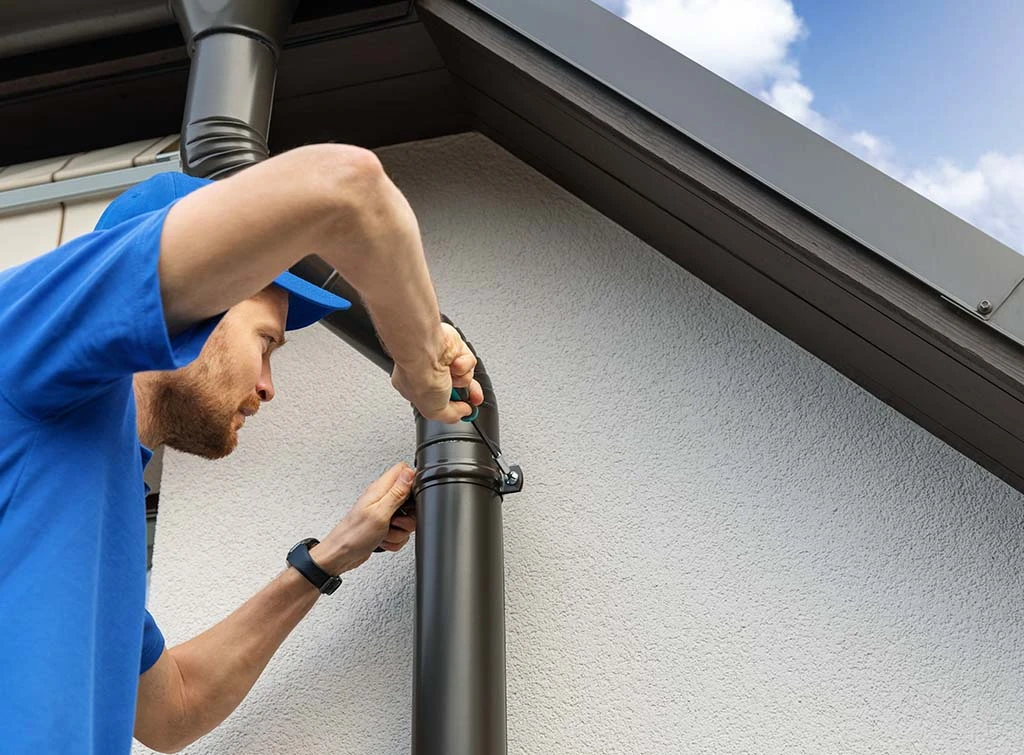
Marketing your gutter installation services
Traditional word-of-mouth recommendations will always be a useful source of work. But an effective marketing strategy in place is crucial for maximising opportunity and growing your business. There are two types of marketing to consider:
Digital
Checkatrade membership is in fact more valuable for recommendations because it shows customers you’ve been checked by Checkatrade – reassuring homeowners that you are a reputable tradesperson. Not to mention homeowners are 3 times more likely to search for a tradesperson on Checkatrade than any other trade directory
Creating a website will help establish an online presence for your business and provide a contact point for potential customers – this can be done relatively easily with free online templates and hosting
Setting up social media profiles will also greatly expand your reach and can be an effective tool for engaging with customers. Many gutter installers often share photos of completed jobs online to showcase their work
Distributing leaflets and flyers around your area is a simple way to raise your local profile – make sure you have permission where appropriate and keep an eye out for homes that ask you not to post promotional content
Applying vehicle graphics with your business name and contact details will turn your van into a powerful marketing tool for when you’re on the move. Checkatrade membership comes with free van vinyls to help you make the most of this advertising approach
Give your new business the best chance of success.
Join the best trades on the UK's leading trade directory
FAQs
How much can I earn as a self-employed gutter installer?
Earnings can vary, but below is an idea of the average gutter installer salary:
Newly qualified gutter installers earn roughly £23,000 a year.
More experienced installers will earn on average £27,500 per year
Going self-employed gives you the opportunity to earn even more. If you’re successful at marketing and finding a niche, you’ll see high demand. The more you make, the more you can take home. Just be sure you can manage all the work you agree to!
Is a gutter installation business profitable?
Housing development is steadily rising in the UK, so there are plenty of opportunities. If you start a rain gutter business, you’ll soon reap the rewards. Over time, you’ll be able to take home a bigger dividend once the pipeline is steady.
How much does it cost to start a seamless gutter business?
It can cost as little as £1,000 to start a gutter business. This will be less if you already have a van, but ultimately it depends how ready you are. You’ll need tools, training, marketing materials and possibly qualifications. All of these will incur costs. However, there are things you can do to keep costs down. Consider hiring equipment until your revenue increases and you can make a permanent purchase.
Become your own boss with Checkatrade
Read case studies to see how our members thrive!
